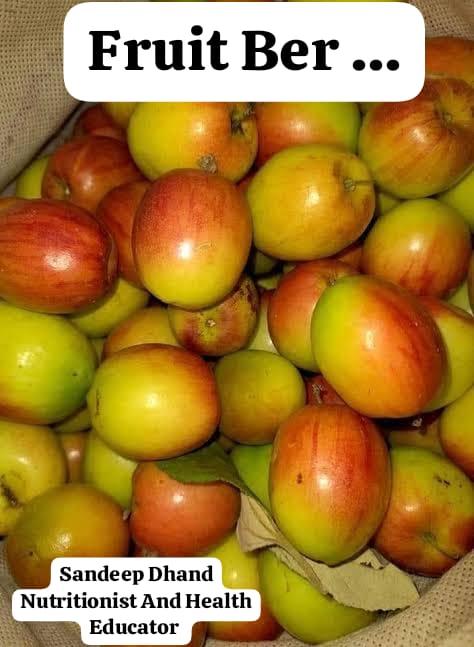Sandeep Dhand
Nutritionist And Health Educator
Ber fruit, known as Indian jujube or Ziziphus mauritiana, is a small yet mighty fruit packed with nutrients, health benefits, and culinary uses. Its versatility and ability to thrive in tough climates have made it a staple in India, China, and many tropical countries. From traditional medicine to modern-day diets, this fruit has held its place as a symbol of health and vitality.
This article explores ber fruit in great detail, from its origin and nutritional profile to its immense benefits, uses, cultivation techniques, and cultural significance.
Introduction to Ber Fruit

Ber fruit is a small, round, or oval-shaped fruit that comes in shades of green, yellow, or reddish-brown. It has a sweet and tangy flavor and a crisp texture. Known for its adaptability, ber fruit grows in arid and semi-arid regions, making it a valuable crop in areas with limited water resources.
Nutritional Profile of Ber Fruit
Ber fruit is often considered a superfood because of its rich nutrient content. Below is a detailed look at the nutritional composition per 100 grams of fresh ber fruit:


Health Benefits of Ber Fruit

The nutritional richness of ber fruit translates into a plethora of health benefits. Here are some of its most notable contributions to health and well-being:

- Boosts Immunity
Ber fruit is a powerhouse of vitamin C, an essential nutrient for a strong immune system. Regular consumption can reduce the risk of infections, colds, and flu.
- Enhances Digestion
The high fiber content in ber fruit helps prevent constipation and promotes healthy digestion. It also improves gut health by supporting the growth of beneficial bacteria.
- Improves Skin Health
Antioxidants and vitamin C in ber fruit combat free radicals, preventing skin aging and promoting a natural glow. Its hydrating properties also keep the skin supple and moisturized.
- Supports Heart Health
Potassium in ber fruit helps regulate blood pressure, while antioxidants reduce bad cholesterol levels, lowering the risk of heart diseases.
- Aids in Weight Management
Ber fruit is low in calories and rich in fiber, making it a great snack for those looking to lose weight. It keeps you full longer and curbs unhealthy cravings.
- Regulates Blood Sugar Levels
With a low glycemic index, ber fruit is suitable for diabetics when consumed in moderation. It helps maintain stable blood sugar levels.
- Strengthens Bones
The calcium and phosphorus content in ber fruit contributes to stronger bones and teeth, reducing the risk of osteoporosis.
- Alleviates Stress and Anxiety
Ber fruit has calming properties and has been traditionally used in Ayurveda to reduce stress and anxiety. Its adaptogenic qualities promote mental clarity.
- Promotes Respiratory Health
Ber fruit is known to soothe the respiratory system and is often used in traditional medicine to treat coughs, colds, and asthma.
- Improves Energy Levels
Natural sugars in ber fruit provide an instant energy boost, making it ideal for athletes and individuals with active lifestyles.
Culinary Uses of Ber Fruit

Sandeep Dhand Nutritionist And Health Educator
Ber fruit is highly versatile in the kitchen. Its sweet and tangy flavor lends itself to various culinary applications.
- Fresh Consumption
Ber fruit is most commonly consumed fresh as a healthy snack. Its crunchy texture and refreshing taste make it a favorite among all age groups.
- Dried Ber
Dried ber is a popular snack and is often added to desserts, trail mixes, and energy bars. It can also be powdered and used as a natural sweetener.
- Pickles and Chutneys
In India, ber fruit is used to make tangy pickles and chutneys. These condiments are a staple in many households and pair well with traditional dishes.
- Jams and Preserves
Ber fruit is processed into jams, jellies, and preserves, offering a delicious way to enjoy its flavor year-round.
- Juices and Beverages
Ber fruit can be blended into refreshing juices or smoothies. It is also used in traditional beverages like sherbets.
Medicinal Uses of Ber Fruit

Ber fruit has been an integral part of traditional medicine systems like Ayurveda and Unani for centuries. Its therapeutic properties make it a natural remedy for various ailments.
- Treats Digestive Issues
Ber fruit pulp is used to treat indigestion, diarrhea, and constipation. Its fiber content soothes the digestive tract.
- Heals Wounds
Ber fruit leaves are crushed into a paste and applied to wounds to promote healing and reduce inflammation.
- Relieves Cough and Cold
The fruit and its seeds are used in herbal preparations to relieve cough, cold, and other respiratory problems.
- Enhances Sleep
Ber fruit is believed to have sedative properties that help improve sleep quality and treat insomnia.
Cosmetic Uses of Ber Fruit
The antioxidants and vitamins in ber fruit make it a popular ingredient in skincare and haircare products.
- Anti-Aging Benefits
Ber fruit extract is used in anti-aging creams and serums to reduce wrinkles and fine lines.
- Hydrating Properties
The fruit’s natural moisture content makes it a great ingredient for hydrating masks and moisturizers.
- Hair Care
Ber fruit oil is used to nourish the scalp and strengthen hair, reducing hair fall and promoting growth.
Cultivation of Ber Fruit
Ber fruit is a hardy crop that thrives in a variety of climates and soils. Its low maintenance requirements make it a favorite among farmers.
- Ideal Climate
Ber trees grow best in tropical and subtropical climates. They can tolerate high temperatures and are highly drought-resistant.
- Soil Requirements
The tree prefers sandy, loamy, or well-drained soils. It can also grow in saline or alkaline soils, making it suitable for arid regions.
- Planting and Propagation
Propagation Methods: Ber trees are propagated through seeds or grafting.
Planting Season: The monsoon season is ideal for planting saplings, ensuring good root establishment.
- Maintenance
The tree requires minimal care. Regular pruning, fertilization, and pest control are recommended for healthy fruit production.
- Harvesting
Ber fruits are harvested when they turn yellow or reddish-brown. The harvest season typically falls between November and March.
Popular Varieties of Ber Fruit
There are several varieties of ber fruit, each with unique characteristics:
Umran: Large, sweet, and juicy, ideal for fresh consumption.
Gola: Small and tangy, commonly used in pickles.
Seb: Resembles an apple in shape and texture.
Kaithli: A hybrid variety with a balanced taste.
Cultural and Economic Significance
- A Staple in Rural Diets
Ber fruit is often called the “poor man’s apple” due to its affordability and nutritional richness. It is a staple in rural areas.
- Role in Festivals
In India, ber fruit is offered during festivals like “Mahashivratri” and is considered auspicious.
- Economic Importance
Ber cultivation provides livelihood opportunities for farmers in arid regions. Its adaptability to poor soils makes it a valuable crop for marginal lands.
Side Effects and Precautions
While ber fruit is safe for most people, it is essential to consume it in moderation. Here are some potential side effects:
- Overconsumption
Eating too much ber fruit can cause bloating, diarrhea, or stomach discomfort due to its high fiber content.
- Allergies
Some individuals may experience allergic reactions, such as itching or swelling.
- For Diabetics
Though it has a low glycemic index, diabetics should monitor portion sizes to avoid blood sugar spikes.
Conclusion
Ber fruit is a small yet powerful fruit with immense health benefits, culinary uses, and economic significance. Its adaptability to various climates and soils makes it a valuable crop for farmers, while its rich nutritional profile ensures it remains a favorite among health-conscious individuals. From boosting immunity to aiding weight loss, ber fruit is a true superfood that deserves a place in every diet.